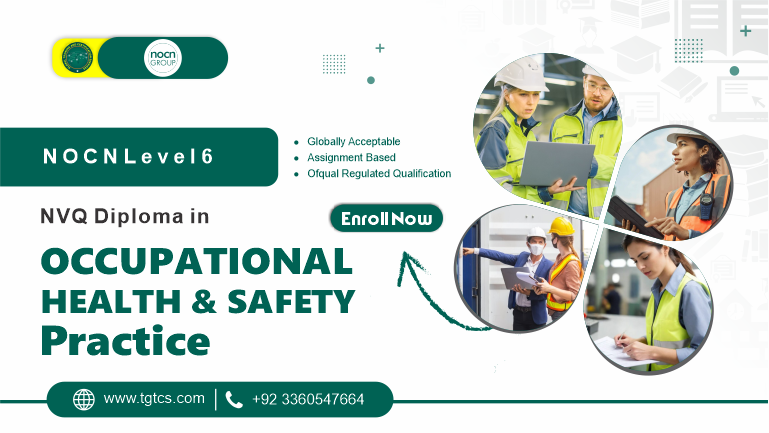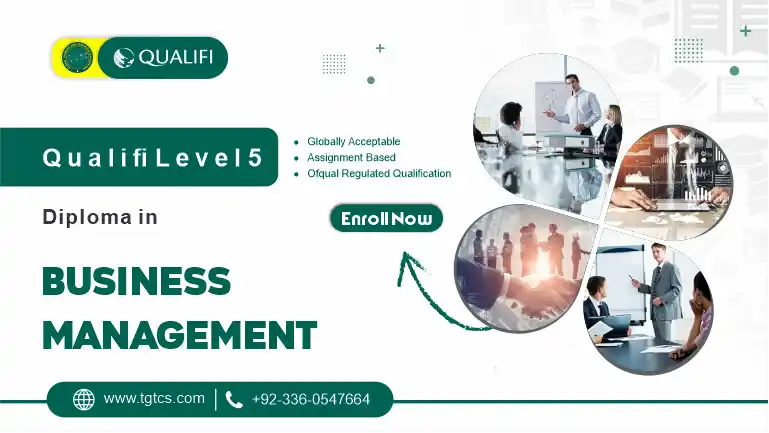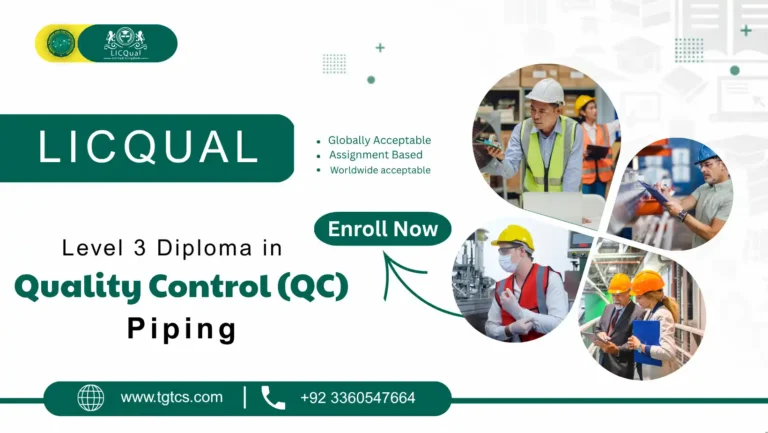NOCN Level 6 NVQ Diploma in Occupational Health and Safety Practice
In today’s rapidly evolving workplace, ensuring the safety and well-being of employees is not only a legal obligation but also a moral responsibility. Organizations worldwide are increasingly prioritizing occupational health and safety (OHS) to reduce risks, enhance productivity, and maintain compliance with regulations. The NOCN Level 6 NVQ Diploma in Occupational Health and Safety Practice is a key qualification that can help you achieve these objectives and further your career in health and safety management.
The NOCN Level 6 NVQ Diploma in Occupational Health and Safety Practice is a nationally recognized qualification designed for health and safety professionals who want to deepen their knowledge and skills in managing occupational safety and risk. It provides learners with the practical expertise needed to perform effectively in various health and safety roles across industries such as construction, manufacturing, and healthcare.
The NOCN Level 6 NVQ Diploma is assessed through a combination of evidence-based assignments and practical assessments. Learners will need to demonstrate their ability to manage health and safety tasks in the workplace. These assessments are designed to ensure that learners are competent in applying their knowledge in real-world situations. There are no exams; instead, you will provide evidence of your work, such as risk assessments, safety reports, and incident investigations.
The NOCN Level 6 NVQ Diploma in Occupational Health and Safety Practice is an excellent way to enhance your skills and career in health and safety management. It provides the practical knowledge and industry-recognized qualifications needed to succeed in this vital field. Whether you are looking to advance your current career or enter the health and safety sector, this qualification will set you on the right path.
The Global Training and Certification Services (TGTCS) is offering this qualification in association with ICTQual UK
The NOCN Level 6 NVQ Diploma in Occupational Health and Safety Practice is a comprehensive, nationally recognized qualification designed for professionals looking to advance their careers in health and safety management. Ideal for individuals already working in the field, this diploma provides in-depth knowledge and practical skills needed to effectively manage health and safety in the workplace.
Upon completion, learners are well-prepared for senior roles such as Health and Safety Manager, Safety Advisor, and Occupational Health Consultant. The qualification is flexible, allowing learners to study at their own pace, and is recognized by industry-leading bodies such as the Health and Safety Executive (HSE) and IOSH, enhancing career prospects in a wide range of industries.
The NOCN Level 6 NVQ Diploma is an essential qualification for those looking to improve workplace safety, ensure compliance with regulations, and foster a positive health and safety culture.
Upon successful completion of the NOCN Level 6 NVQ Diploma in Occupational Health and Safety Practice, learners will be able to:
- Develop and Implement Health and Safety Policies:
- Design and implement comprehensive health and safety strategies and policies that align with both organizational goals and legal requirements.
- Lead the development of health and safety management systems to ensure effective workplace safety.
- Conduct Risk Assessments and Hazard Analysis:
- Carry out detailed risk assessments and identify potential hazards in the workplace, ensuring all risks are managed and mitigated effectively.
- Provide recommendations for eliminating or minimizing risks to enhance employee health and safety.
- Ensure Legal Compliance and Regulatory Adherence:
- Demonstrate a thorough understanding of health and safety legislation, regulations, and industry standards.
- Ensure the organization complies with national and international health and safety laws and standards, safeguarding employees and mitigating legal risks.
- Investigate and Report Workplace Accidents:
- Conduct thorough investigations into workplace accidents, identifying root causes, and creating effective reports to prevent future incidents.
- Recommend corrective actions based on accident investigations to improve safety protocols and prevent recurrence.
- Promote and Monitor Safety Culture:
- Foster a positive safety culture across the organization by encouraging employee engagement and participation in safety programs.
- Monitor and evaluate the effectiveness of safety initiatives to ensure continuous improvement in the workplace environment.
- Provide Health and Safety Training and Leadership:
- Design and deliver training programs to equip employees with the necessary knowledge and skills to manage their health and safety responsibilities.
- Lead and manage health and safety teams, ensuring alignment with organizational safety goals and objectives.
- Develop Emergency Procedures and Safety Plans:
- Create and implement emergency response procedures for various scenarios, including accidents, fires, and natural disasters.
- Ensure that all employees are familiar with emergency plans and protocols to guarantee a quick and organized response in emergencies.
- Monitor and Evaluate Safety Performance:
- Regularly monitor and assess workplace safety performance, using tools such as audits, inspections, and safety reviews.
- Use performance data to identify areas for improvement and to implement corrective actions that ensure ongoing safety compliance.
- Engage Stakeholders in Health and Safety Initiatives:
- Effectively communicate health and safety information to stakeholders, including employees, management, and regulatory bodies.
- Engage in discussions and consultations with stakeholders to support and promote health and safety initiatives across the organization.
- Apply Leadership Skills in Health and Safety Management:
- Demonstrate leadership skills by influencing and motivating others to follow best practices in health and safety management.
- Take proactive steps to manage health and safety issues, making decisions that enhance the overall safety culture of the organization.
These learning outcomes ensure that graduates of the NOCN Level 6 NVQ Diploma in Occupational Health and Safety Practice are fully equipped to manage and improve workplace safety, contribute to organizational risk management, and lead health and safety initiatives at the senior management level.
Mandatory Units
The Units of NOCN Level 6 NVQ Diploma in Occupational Health and Safety Practice are as :
- Control Health and Safety Risks
- Develop and Implement Effective Communication Systems for Health and Safety Information
- Develop and Implement Health and Safety Emergency Response Systems and Procedures
- Develop and Implement Health and Safety Induction Processes
- Develop and Implement Health and Safety Review Systems
- Develop and Implement the Health and Safety Policy
- Develop and Maintain Individual and Organisational Competence in Health and Safety Matters
The OTHM Level 7 International Diploma in Process Safety Management (PSM) offers numerous benefits for professionals seeking to advance their careers in safety leadership, risk management, and process safety across high-risk industries. Here are the key benefits of pursuing this advanced qualification:
1. Globally Recognized Accreditation
The OTHM Level 7 Diploma is accredited by OTHM and recognized internationally, ensuring that your qualification holds global value. This opens doors to job opportunities worldwide in sectors such as chemical, petrochemical, energy, manufacturing, and oil & gas.
2. Enhanced Career Opportunities
By completing the course, you position yourself for career progression into senior safety management roles, including Process Safety Manager, Risk Management Consultant, Safety Director, and HSE Manager. This qualification increases your chances of landing leadership roles that command higher salaries and greater responsibility.
3. Comprehensive Knowledge of Process Safety
The course provides deep insights into process safety management (PSM), covering crucial areas like risk assessment, hazard analysis, safety management systems, emergency response, and safety culture. You’ll be well-equipped to manage and mitigate risks in complex, high-hazard environments.
4. Practical Application of Risk Management
Through the course, you will gain hands-on skills in assessing and managing process risks. The program prepares you to apply risk management tools and techniques to prevent accidents and enhance safety across industrial processes, making you a valuable asset to employers.
5. Improved Organizational Safety
This diploma emphasizes the creation and implementation of effective safety management systems (SMS) that align with international standards. Upon completion, you’ll be capable of designing and managing safety programs that ensure compliance with regulations and reduce risks to people, assets, and the environment.
6. Pathway to Higher Education
The OTHM Level 7 Diploma in PSM serves as a pathway for further education, including Master’s programs or other postgraduate qualifications. Many universities accept this diploma for entry into advanced degree courses in process safety, industrial management, or related fields, helping you further specialize your knowledge.
7. Flexible Learning Options
The course offers flexible learning options, including online and distance learning, which allows professionals to study at their own pace while balancing work and personal commitments. This flexibility makes it ideal for busy professionals who wish to enhance their qualifications without interrupting their career.
8. Leadership and Safety Culture Skills
A major focus of the diploma is on leadership and fostering a safety-first culture within organizations. As a graduate, you’ll have the tools to lead safety initiatives, influence organizational safety practices, and create an environment where safety is prioritized at every level.
9. Regulatory Compliance Expertise
With a focus on global safety standards such as OSHA, ISO 45001, and EPA, this course ensures you are equipped to navigate the complexities of safety compliance. You’ll be prepared to lead organizations in meeting regulatory requirements and ensuring industry best practices are followed.
10. Real-World Impact
The skills gained through the OTHM Level 7 Diploma in PSM have a direct impact on safety in high-risk industries. Graduates can significantly reduce operational hazards, prevent accidents, improve safety performance, and ensure organizational compliance, contributing to a safer working environment for all.
11. Increased Earning Potential
With a specialization in process safety management, you’ll be qualified for higher-paying roles with greater responsibility. The demand for skilled process safety professionals continues to grow, making this diploma a valuable asset that can boost your earning potential in the long term.
12. Industry-Relevant Content
The course curriculum is designed to meet the real-world challenges faced by professionals in high-hazard industries. By focusing on practical safety management strategies, risk reduction, and compliance with safety regulations, the diploma ensures that you are prepared to meet the demands of the modern workplace.
13. International Career Mobility
As industries around the world strive to improve their safety practices, professionals with a Level 7 Diploma in Process Safety Management are in high demand globally. Whether you are working in local or international markets, this qualification will give you the flexibility and recognition to advance your career anywhere.
The OTHM Level 7 International Diploma in Process Safety Management (PSM) is designed for experienced professionals who are looking to enhance their expertise in process safety and risk management. This advanced qualification is ideal for individuals who are already working in safety, engineering, or process management roles and want to deepen their knowledge in high-risk industries. Below are the key characteristics of the ideal learner for this course:
1. Professional Background in Safety or Engineering
The ideal learner typically has a background in safety management, engineering, process management, or other technical fields related to industrial operations. Those with experience in sectors such as chemical engineering, petrochemicals, oil and gas, manufacturing, or energy will find the course particularly relevant.
2. Experience in High-Risk Environments
Individuals with at least 2-3 years of experience working in high-risk environments, where process safety and risk management are critical, will benefit the most from this course. Experience in hazardous industries such as oil and gas, chemicals, or energy will provide a strong foundation for the advanced topics covered in the diploma.
3. Current or Aspiring Safety Leaders
This qualification is ideal for professionals aiming to move into leadership roles within safety management, including positions such as Process Safety Manager, Safety Director, Risk Manager, or HSE Manager. It is designed to enhance leadership capabilities and strategic decision-making in managing process safety at a senior level.
4. Individuals Seeking Career Advancement
Professionals who are looking to advance their careers in process safety management or related fields will find this course to be an excellent opportunity to develop the technical and leadership skills necessary for career progression. Those interested in gaining senior roles or specializing in process safety will benefit from the knowledge and credentials offered by the diploma.
5. Ambitious Professionals Looking for Global Opportunities
The OTHM Level 7 Diploma in PSM is ideal for those seeking international career mobility. As the course is recognized globally, it is perfect for individuals looking to work in multinational companies or in various countries where process safety expertise is highly sought after.
6. Individuals Committed to Improving Safety Standards
The course is designed for professionals who are passionate about improving safety standards, reducing operational risks, and ensuring compliance with regulatory requirements. Those committed to advancing safety practices within their organizations and industries will benefit from the course’s comprehensive approach to process safety.
7. People with a Level 6 Qualification or Equivalent Experience
Learners should have a Level 6 qualification (such as a Bachelor’s degree) in a related field, such as engineering, safety, or process management, or possess equivalent professional experience. The diploma builds on this existing knowledge and provides advanced skills in process safety management.
8. Self-Motivated and Capable of Independent Learning
Given the advanced nature of this qualification, the ideal learner should be self-motivated, capable of managing their studies alongside work commitments, and able to engage in independent learning. The course is available in flexible formats, such as online or distance learning, making it suitable for busy professionals.
The OTHM Level 7 International Diploma in Process Safety Management (PSM) is designed to provide advanced knowledge and skills in managing process safety risks in various industrial environments. As industries continue to grow and evolve, so too will the demand for professionals who can ensure that safety standards are met while managing process safety risks effectively. Here’s an outline of the future progression for someone completing this course:
1. Advancement in Career Roles:
- Leadership Positions: Graduates will be positioned for roles such as Process Safety Managers, Health and Safety Directors, or Operational Risk Managers. This diploma equips candidates with the tools and knowledge required to lead safety programs within large organizations.
- Global Opportunities: Given its international focus, graduates can pursue opportunities worldwide, particularly in sectors like oil & gas, chemicals, pharmaceuticals, and manufacturing, where process safety management is crucial.
- Specialist Roles: There will be an increasing demand for process safety specialists, who can guide organizations in implementing industry best practices, conducting audits, risk assessments, and developing safety culture within high-risk environments.
2. Technological Advancements in Safety Management:
- Integration of Technology: With the rise of Industry 4.0, graduates of the OTHM Level 7 Diploma will likely be involved in incorporating new technologies such as predictive analytics, artificial intelligence (AI), and the Internet of Things (IoT) into safety systems. These technologies can help detect and mitigate risks before incidents occur, making process safety management more data-driven and proactive.
- Automation and Remote Monitoring: The integration of automation in process safety management will be more prevalent. Graduates may work on developing and managing systems that provide real-time data monitoring and decision-making in hazardous environments.
3. Continuous Learning and Certification:
- Post-Diploma Certifications: There will be a growing need for continuous education in process safety, leading to additional certifications or specialized qualifications in areas like Risk Management, Hazard Identification, and Safety Leadership. This ensures that professionals stay updated with regulatory changes and advancements in safety technology.
- Specialized Training Programs: As industries adopt more sophisticated and complex technologies, training programs will evolve to address niche needs, such as cybersecurity for process safety or crisis management in high-risk settings.
4. Regulatory and Compliance Growth:
- Increased Regulatory Demands: Governments and international bodies will continue to raise the bar for safety standards, requiring stricter compliance with environmental, health, and safety regulations. Graduates of the OTHM Level 7 Diploma will play a key role in ensuring that organizations are in line with these evolving regulations.
- ISO 45001 and Other Standards: The need for ISO certification in safety and environmental management will drive the demand for graduates who can help organizations achieve and maintain these standards. Process Safety Management will likely be incorporated into broader health and safety certifications, with new frameworks emerging globally.
5. Contribution to Safety Culture:
- Cultural Transformation: Process safety is not only about implementing technical measures but also fostering a safety culture within organizations. Graduates will lead efforts to instill a culture of safety, where all employees are engaged and contribute to the identification, assessment, and management of risks.
- Behavioral Safety: There will be an increased focus on behavioral safety programs, aiming to reduce human error by influencing employee behavior and ensuring they adhere to safety protocols. Graduates will be involved in designing and executing these programs.
6. Industry-Specific Specialization:
- Sector-Specific Roles: The future will see a growing trend for professionals specializing in process safety for specific sectors. For example, graduates may focus on process safety in the pharmaceutical industry, energy sector, or manufacturing, addressing the unique challenges and risks present in these industries.
- Risk Management in Hazardous Industries: The importance of process safety in high-hazard sectors (e.g., oil & gas, chemical production, power generation) will continue to drive the need for specialized knowledge in areas like HSE management, emergency response, and hazardous materials handling.
7. Global Collaboration:
- Cross-Border Cooperation: Given the international scope of this qualification, future professionals will often work in multinational teams and collaborate on safety initiatives that span borders. This might include joint ventures, partnerships, and international safety standards development.
- Standardization of Global Safety Practices: As global businesses expand, the demand for universally accepted process safety standards and frameworks will increase. Graduates will be instrumental in developing and adopting international safety practices across diverse industries.
8. Consultancy and Advisory Roles:
- Consulting Firms: Graduates may pursue careers in consulting, advising corporations on improving their process safety management systems. This could involve audits, gap analysis, and the development of tailored safety strategies.
- Expert Advising: With deep expertise in process safety, professionals will be sought after as expert witnesses or advisors during safety investigations, incident analyses, and legal proceedings.
9. Research and Development:
- Innovation in Safety Tools: There will be a growing emphasis on the development of new safety tools and methodologies to assess and manage risks more effectively. Graduates may engage in research, developing innovative safety solutions or contributing to the advancement of process safety science.
- Safety Knowledge Sharing: Graduates could also contribute to industry knowledge-sharing platforms, publishing case studies, research papers, and whitepapers on advancements in process safety management.
Course Overview
Course Level
Level 6
Course Units
7 Mandatory Units
Duration
6 to 12 months
Awarding Body
NOCN






